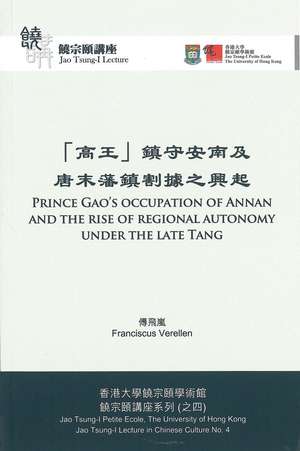Prince Gao’s Occupation of Annan and the Rise of Regional Autonomy under the Late Tang
Autor Franciscus Verellenen Limba Engleză Paperback – 31 aug 2015
Gao Pian (822–887), the architect of the medieval citadel of Hanoi and of large-scale defensive and communication works in several frontier regions of China, is a towering figure in the military, political, and intellectual history of both countries. A charismatic governor and commander, inclined to the occult arts of strategy, he was a man of wide learning and curiosity, with a strong attraction to Daoism, as well as a talented poet. In turn reviled and revered, for his pivotal roles in hastening both the end of the Tang and the emergence of Vietnam, Gao Pian became the object of local cults in his own lifetime. The presence of prominent literati on his staff contributed to this renown. At the end of his career, Gao laid the foundations of an independent kingdom in Huainan under the Five Dynasties culmination of regional autonomy in post-An Lushan China.
Preț: 69.29 lei
Nou
Puncte Express: 104
Preț estimativ în valută:
13.26€ • 14.18$ • 11.05£
13.26€ • 14.18$ • 11.05£
Cartea se retipărește
Doresc să fiu notificat când acest titlu va fi disponibil:
Se trimite...
Preluare comenzi: 021 569.72.76
Specificații
ISBN-13: 9789881297822
ISBN-10: 9881297826
Pagini: 112
Ilustrații: 6 color illus.
Dimensiuni: 140 x 210 mm
Greutate: 0 kg
Editura: Hong Kong University Press
Colecția Hong Kong University Press
ISBN-10: 9881297826
Pagini: 112
Ilustrații: 6 color illus.
Dimensiuni: 140 x 210 mm
Greutate: 0 kg
Editura: Hong Kong University Press
Colecția Hong Kong University Press
Notă biografică
Franciscus Verellen is chair professor in the History of Daoism at the Ecole Française d’Extrême-Orient (EFEO) and head of the EFEO Hong Kong Centre. A member of the French Academy of Inscriptions and Belles-Lettres and former director of the Ecole Française d’Extrême-Orient (2004–2014), Franciscus Verellen has taught at the Ecole Pratique des Hautes Etudes, Paris, at Columbia and Princeton Universities, UC Berkeley and the Chinese University of Hong Kong (CUHK). He has published widely on religion and regional culture in China, including The Taoist Canon (3 volumes, Chicago 2004, edited with Kristofer Schipper). He is a senior research fellow and member of the International Advisory Board of the Institute of Chinese Studies (CUHK), an honorary research fellow in the Jao Tsung-I Petite Ecole (HKU), and a member of the Expert Advisory Group “Horizon 2020” to the European Commission.
Textul de pe ultima copertă
Chinese Culture
Descriere
Gao Pian (822–887), the architect of the medieval citadel of Hanoi and of large-scale defensive and communication works in several frontier regions of China, is a towering figure in the military, political, and intellectual history of both countries. A charismatic governor and commander, inclined to the occult arts of strategy, he was a man of wide learning and curiosity, with a strong attraction to Daoism, as well as a talented poet. In turn reviled and revered, for his pivotal roles in hastening both the end of the Tang and the emergence of Vietnam, Gao Pian became the object of local cults in his own lifetime. The presence of prominent literati on his staff contributed to this renown. At the end of his career, Gao laid the foundations of an independent kingdom in Huainan under the Five Dynasties culmination of regional autonomy in post-An Lushan China.
